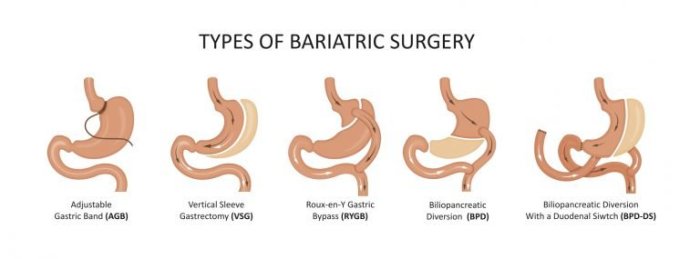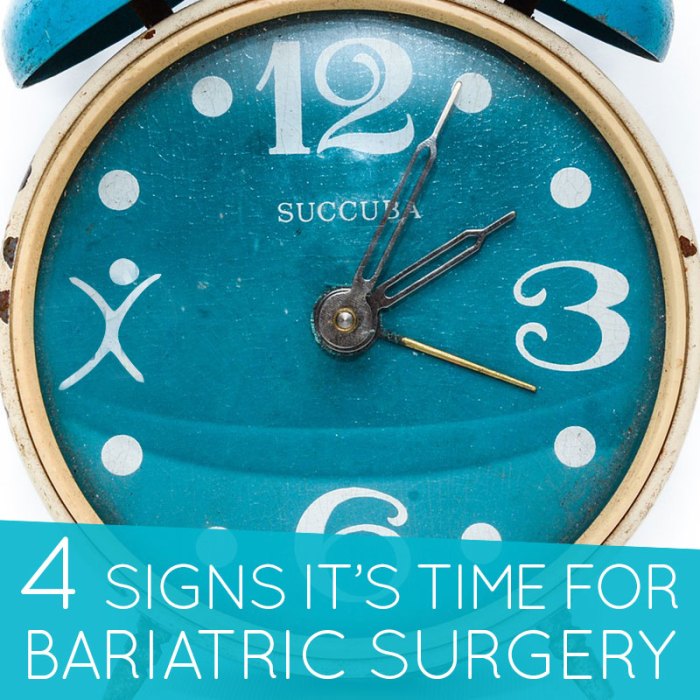How to get time off work for bariatric surgery – Navigating the process of requesting time off work for bariatric surgery can be daunting. This guide provides a comprehensive roadmap, empowering you with the knowledge and strategies to successfully secure the necessary leave.
From understanding the medical necessity of the procedure to effectively communicating with your employer, we cover every aspect to ensure a smooth and stress-free transition.
Medical Necessity

Bariatric surgery is a medically necessary procedure for individuals with severe obesity who have failed to achieve and maintain weight loss through non-surgical methods.
If you’re considering bariatric surgery, you may be wondering how to get time off work. The recovery time for bariatric surgery varies depending on the type of procedure you have, but most people need to take at least a week off work.
After surgery, you may experience some pain, nausea, and fatigue. You may also need to follow a special diet and exercise plan. Once you’ve recovered from surgery, you’ll need to follow up with your doctor regularly. You’ll also need to make lifestyle changes to maintain your weight loss.
When Can I Drive After Gastric Sleeve Surgery? Driving after bariatric surgery is another important consideration. It’s important to follow your doctor’s instructions on when you can drive again. You may need to wait until you’re fully recovered from surgery and your pain is under control.
If you’re planning to have bariatric surgery, talk to your doctor about how to get time off work and when you can drive again.
Obesity is a chronic disease that increases the risk of developing serious health conditions, including heart disease, stroke, type 2 diabetes, and cancer. Bariatric surgery can help individuals lose weight and improve their overall health by reducing the size of the stomach and/or altering the way the intestines absorb nutrients.
Criteria for Medical Necessity
The criteria for medical necessity for bariatric surgery vary depending on the insurance company. However, most insurance companies require that the following criteria be met:
- Body mass index (BMI) of 40 or higher, or a BMI of 35 or higher with at least one obesity-related comorbidity, such as heart disease, stroke, type 2 diabetes, or cancer.
- Failure to achieve and maintain weight loss through non-surgical methods, such as diet and exercise.
- Documentation of the patient’s obesity-related health problems and the impact of obesity on their quality of life.
Documentation Required
The following documentation is typically required to demonstrate medical necessity for bariatric surgery:
- A letter from the patient’s physician that describes the patient’s weight history, obesity-related health problems, and attempts at non-surgical weight loss.
- A physical examination report that includes the patient’s height, weight, BMI, and blood pressure.
- Laboratory test results that show the patient’s cholesterol levels, blood sugar levels, and other health markers.
- A psychological evaluation that assesses the patient’s readiness for bariatric surgery.
Requesting Time Off
Once your medical necessity has been approved, it’s time to request time off work for your bariatric surgery. The key to a successful request is clear communication and providing supporting documentation.
If you’re considering bariatric surgery, it’s important to plan for time off work. Most people need at least two weeks to recover from the surgery. During this time, you’ll need to rest and avoid strenuous activity. You may also experience some pain and discomfort, so it’s important to have someone to help you with daily tasks.
For more information on how to prepare for bariatric surgery, including how to halt weight loss after the procedure, check out How to Halt Weight Loss After Gastric Sleeve: A Comprehensive Guide . Additionally, don’t forget to talk to your doctor about how much time off work you’ll need.
Submit a Written Request
Submit a formal written request to your supervisor or HR department. Include the following information:
- Your name and employee ID
- The dates you need off
- The reason for your absence (bariatric surgery)
- A statement from your doctor confirming the surgery and recovery period
- Any additional documentation or information required by your company
Provide Supporting Documentation, How to get time off work for bariatric surgery
In addition to your written request, provide supporting documentation from your doctor, such as:
- A letter confirming the surgery date and estimated recovery time
- A copy of your surgical consent form
- Any other medical records that support your need for time off
Communicate Clearly and Follow Up
Communicate your request clearly and follow up with your supervisor or HR department to ensure they have received and processed your request. Be prepared to answer any questions they may have.
Employer Considerations: How To Get Time Off Work For Bariatric Surgery

Understanding legal obligations and employer considerations is crucial when requesting time off for bariatric surgery. Employers have certain responsibilities under the law, and it’s essential to be aware of these.
Family and Medical Leave Act (FMLA)
The FMLA entitles eligible employees to take up to 12 weeks of unpaid, job-protected leave per year for specific medical reasons, including bariatric surgery. To be eligible, employees must have worked for the employer for at least 12 months and have worked at least 1,250 hours in the previous 12 months.
Negotiating with Employers
Even if an employee is not eligible for FMLA, employers may still be willing to grant time off for bariatric surgery. It’s important to approach negotiations with a positive attitude and be prepared to provide medical documentation and a return-to-work plan.
When negotiating, consider the following strategies:
- Provide a detailed medical justification from a qualified healthcare provider.
- Explain the benefits of bariatric surgery and how it will improve your health and productivity.
- Discuss a phased return-to-work plan that accommodates your recovery.
- Offer to work remotely or on a modified schedule during your recovery.
Recovery Period

After bariatric surgery, patients typically experience a recovery period that varies depending on the type of procedure performed. Generally, the recovery time ranges from two to four weeks, with the first week being the most critical.
During this period, patients may experience pain, fatigue, nausea, and other side effects that can impact their ability to work. It is crucial to plan for a gradual return to work to ensure a smooth recovery and prevent complications.
Accommodations
To facilitate a successful return to work, patients may require certain accommodations, such as:
- Flexible work hours or reduced workdays
- Modified job duties or workload
- Access to a private or quiet space for rest
- Regular breaks throughout the day
Gradual Return-to-Work Plan
A gradual return-to-work plan allows patients to progressively increase their work hours and responsibilities while monitoring their recovery progress. This plan should be tailored to the individual’s specific needs and the demands of their job.
Initially, patients may return to work for a few hours each day, gradually increasing their hours as they recover. It is important to listen to your body and take rest breaks when needed.
Navigating the process of getting time off work for bariatric surgery can be a bit daunting. However, by following the expert guidance provided in How to Secure Time Off for Bariatric Surgery: A Comprehensive Guide , you can ensure a smooth transition and focus on your recovery.
This guide covers everything from planning your request to negotiating with your employer, making it an invaluable resource for anyone seeking time off for this important procedure.
Support and Resources
Undergoing bariatric surgery can be a significant life event. Having a strong support system is crucial for a successful recovery and return to work.
Numerous support groups and resources are available to individuals undergoing bariatric surgery. These groups provide a safe and supportive environment where individuals can connect with others who have undergone similar experiences, share their journeys, and offer encouragement.
Online Support Groups
- ObesityHelp Support Groups: A large online community with forums and support groups dedicated to bariatric surgery.
- American Society for Metabolic and Bariatric Surgery (ASMBS) Support Groups: ASMBS offers a directory of local support groups across the United States.
- BariatricPal: An online forum and community for individuals undergoing bariatric surgery.
Local Support Groups
Many hospitals and surgical centers offer support groups specifically for their bariatric surgery patients. These groups provide an opportunity to connect with others in the same area and receive tailored support.
Support from Family and Friends
Family and friends can play a vital role in providing emotional support and practical assistance during recovery. Encourage them to attend support groups with you, help with meal preparation, and offer encouragement.
Managing Stress and Coping with Challenges
Bariatric surgery can be a physically and emotionally challenging experience. It is important to develop coping mechanisms to manage stress and overcome challenges.
- Exercise:Regular exercise can help reduce stress and improve mood.
- Mindfulness:Practicing mindfulness techniques can help you stay present and manage difficult emotions.
- Therapy:Talking to a therapist can provide support and guidance in coping with the emotional aspects of bariatric surgery.
Epilogue
Remember, open communication, proper documentation, and a proactive approach are key to obtaining the time off you need. Utilize the resources and support systems available to you, and don’t hesitate to seek guidance if needed. With the right preparation, you can confidently embark on your bariatric surgery journey knowing that your job security is protected.
User Queries
What is the typical recovery period after bariatric surgery?
The recovery period varies depending on the individual and the type of surgery performed. Generally, it takes 2-4 weeks to return to light activities and 6-8 weeks to resume most regular activities.
Can I use FMLA to take time off for bariatric surgery?
Yes, FMLA may be used to take up to 12 weeks of unpaid, job-protected leave for a serious health condition, including bariatric surgery.
What should I include in my request letter for time off?
Your request letter should include the dates you need off, the reason for your absence (bariatric surgery), a statement that you have explored all other options, and any supporting documentation from your doctor.






